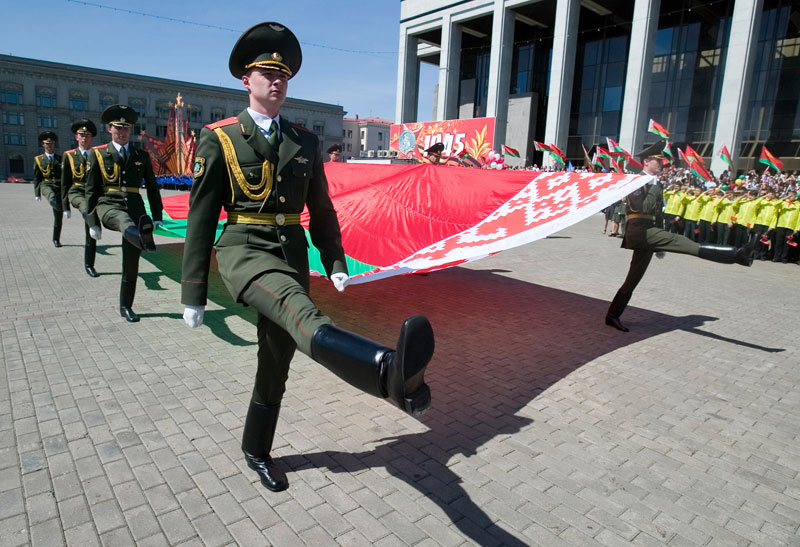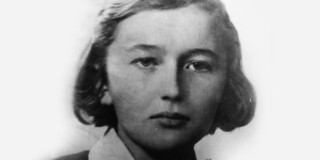Belarus: this is the last European marxist dictatorship, in the hands of a Stalin admirer
After yesterday's elections in Belarus, once again characterized by massive electoral fraud, many things are being kept quiet about that country in the media.
Many media describe Belarus, rightly, as the last dictatorship in Europe, but they forget to indicate the ideology of that regime. Among the Spanish media I have only found a few who say so. That is why I am encouraged to write this article: to shed a little light on the reality of this country.

The recovery of the independence of Belarus in 1991
The first time Belarus appeared on the maps as an independent country was in 1918, before the end of World War I and a few weeks after the Treaty of Brest-Litovsk, by which Bolshevik Russia signed a humiliating peace with Germany. That first republic of Belarus, actually a puppet state of Germany, did not last a year: as soon as the German Army withdrew from its soil in December 1918, after its defeat in the Great War, the Bolsheviks invaded the country, incorporating it into the USSR. Belarus would not become an independent country again until 1991, after the fall of the Soviet Union. That same year, only one member of his Supreme Soviet opposed independence: Aleksandr Lukashenko.
Lukashenko's rise to power and his resort to electoral fraud
The first president of Belarus after independence was Stanislav Shushkévich. Despite being a former member of the Communist Party, he tried to westernize the country and separate it from its communist past. In 1993 Lukashenko, then chairman of the anti-corruption commission in the Belarusian Parliament, accused Shushkevich of corruption and rapprochement with the West, and promoted a motion of no confidence.

In January 1994 elections were held in which Lukashenko won with 45% of the vote. They were the last free and non-fraudulent elections in the country. Since then, Lukashenko has remained in power by rigging electoral processes, in which he obtained exaggerated majorities: 77.4% in 2001, 84.4% in 2006, 80.44% in 2010 and 84.14% in 2015. In yesterday's elections, the exit polls gave him 79.7%. Something similar has been happening in parliamentary elections. Since the 2019 elections, of the 110 elected deputies, 90 are independents related to Lukashenko.
Stalinist Communist Party of Belarus, parliamentary support of Lukashenko
Apart from these independents, in all the elections held since 1995, the formation with the most deputies has been the Communist Party of Belarus, a Stalinist organization related to Lukashenko. It currently has 8 deputies. There are also some minority parties that are purely government puppets. The only theoretical opposition is a single deputy from the Liberal Democratic Party, a nationalist formation similar to its Russian counterpart - chaired by Vladimir Zhirinovsky - and who also supports Lukashenko. Thus, there is no real opposition in the Belarusian Parliament. This is because the country's elections do not allow the participation of independent observers, and the electoral committees that count the votes are controlled by the Government.

A country with its media under the control of the State
On the other hand, it is not easy for opposition parties to make themselves known. The main media in the country are in the hands of the State. The media related to the opposition are minority and have many problems to survive, since they need a license granted by the Government - in a totally capricious way - in order to exist. The main opposition newspaper, the Belorusskaya Delovaya Gazeta, was shut down by the government in 2006. The vast majority of television channels are controlled by the state. In addition, digital media also need a license to operate and if they do not have it, they are blocked by the State. As Freedom House has denounced, in Belarus there is no judicial independence (the judges are controlled by Lukashenko), the media can be fined for the mere fact of denouncing cases of corruption or for being accused by the Government of spreading "extremism", and the right to demonstrate is severely restricted.
Belarusian political prisoners and the repression of the opposition in the country
According to the Belarusian NGO Viasna, in July this year there were 24 political prisoners in the country's prisons. In addition, during that month, 420 people were arrested for participating in peaceful demonstrations. One of those arrested was opposition leader Viktar Babaryka, the one Lukashenko first accused - falsely - of tax evasion, and after organizing a coup as part of a foreign conspiracy. That arrest and the false accusations leveled against the detainee sparked protests across the country. On July 28, 50 people were arrested by the KGB for simply signing petitions for Babaryka's release.

A large museum from the Soviet era that even preserves the KGB
Belarus is like a museum from the Soviet era. The state has continued to implement a planned economy, which the government calls "market socialism". Most of the companies are in the hands of the state, and the country has a strong economic dependence on Russia. Interestingly, the Belarusian political police are still called the KGB, as in the USSR: even its emblem is an imitation of the emblem of the Soviet KGB. In 1991, after independence, the white, red and white flag used in 1918 was recovered, but in 1995 Lukashenko organized a referendum (also rigged) to recover the flag of the Byelorussian Soviet Socialist Republic: he simply took the sickle and the hammer. The Soviet era coat of arms, including a red star, was also recovered, replacing the hammer and sickle with a map of the country.

Lukashenko, declared admirer of Communist dictators Lenin and Stalin
As a good nostalgic of the communist era, Lukashenko has declared his admiration for the communist dictators Lenin and Stalin: "I have a long way to go to reach them," he said in 2012. Unlike what happened in other countries that were subjected to communist dictatorships, in those that have demolished the statues of the dictator, in Minsk, the capital of Belarus, there is still a statue of Lenin and stands before the seat of the Government. Currently, 38 Belarusian cities maintain monuments dedicated to that bloody dictator. In this sense Belarus is second only to Russia, where there are still monuments to Lenin in 52 cities.

The demolition of the crosses that remembered the victims of Stalinism in Kuropaty
Parallel to its exaltation of the criminal tyrants of the Soviet Union, the Lukashenko government is bent on hiding the crimes of communism. As an example, in April of last year the Lukashenko government ordered the demolition of 70 crosses commemorating the victims of Stalinism in the Kuropaty forest, near Minsk, where tens of thousands of people were killed by communists and buried in common pits between 1937 and 1941.
In July 2016, in a meeting with Gennadiy Zyuganov, president of the Communist Party of the Russian Federation (an organization nostalgic for Stalinism), Lukashenko lamented the fall of the USSR: "We have lost a country, but the most horrible thing is that we have lost a system that it had taken decades to build and that had no match anywhere in the world". The system he was referring to was a brutal dictatorship that killed millions of people for more than 70 years.

Belarus, allied with dictatorships and supported by the extreme left
Given the character of the Lukashenko regime, no one will be surprised to learn that Belarus' international allies include Iran, China, Cuba, Venezuela and Syria. Taking into account the ideology of the Lukashenko dictatorship, it is not strange to observe the external support of far-left organizations for that regime. Without going any further, a month ago the Spanish communist coalition Izquierda Unida came out in defense of Belarus during a debate about that country in the European Parliament:
|
Don't miss the news and content that interest you. Receive the free daily newsletter in your email: Click here to subscribe |
- Most read
- The real reason for Sánchez's victimizing letter using his wife as an excuse
- The brutal 'touch and go' of a Lufthansa Boeing 747 at Los Angeles Airport
- Portugal confirms that it has begun its transition to the F-35 and indicates bad news for Spain
- Lenin: numbers, data and images of the crimes of the first communist dictator
- A Corporal of the Regular Forces of the Spanish Army dies in an exercise in Poland
- The ten oldest national flags in the world that are still in use today
- The interior of the Statue of Liberty torch and the sabotage that canceled its visits

 ES
ES





Opina sobre esta entrada: